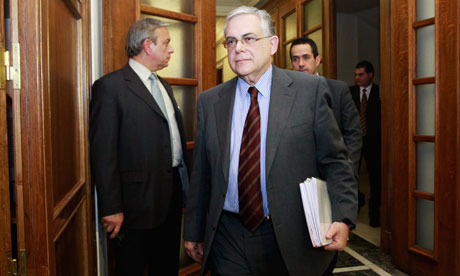Helena Smith in Athens guardian.co.uk, Tuesday 21 February 2012 20.06 GMT
Prime minister Lucas Papademos cites 'historic day' but other parties cite €130bn deal as delay tactic that does stop default
Greece's prime minister Lucas Papademos has said the €130 bailout agreement marked a 'historic day', but failed to quell anger from voters. Photograph: John Kolesidis/Reuters
Greeks reacted with relief, anger and fear to the news that their country has been granted what is the biggest bailout in western history – not once, but twice in less than two years.
For the prime minister, Lucas Papademos, the €130bn deal was nothing less than a "historic day" with an end to the ferocious negotiations between Athens, foreign lenders and private creditors who hold its debt. Finally, he said, an end had come to the uncertainty that has enveloped Greece.
"We now have the ability to progress with stability, to limit uncertainty. and to increase trust in the Greek economy in order to create better conditions," he said after 14 hours during which the rescue plan was agreed.
For the first time, said his finance minister, Evangelos Venizelos, Greece had found a formula where its €350bn debt mountain was "reduced rather than augmented".
There was marked relief among politicians on both the left and right who have put aside ideology to back Papademos's emergency coalition government. Last week, as Germany piled the pressure on Greece, casting doubts over its trustworthiness and place in Europe, it appeared far from sure whether the deal would be done.
"It was not a given, we had many objections from many sides, and many open issues," government spokesman Pandelis Kapsis, said. "After very difficult negotiations, we achieved a very good result." He emphasised the agreement of the private sector to participate in a bond swap aimed at lessening the country's debt burden by €100bn.
Failure would have exacted a heavy toll. Athens faces €14.5bn in maturing debt next month. Without the money to cover the loan repayments the country would have been forced into a messy default with potentially disastrous consequences for its people and for the eurozone.
"It is an important decision that distances Greece from [the spectre of] bankruptcy," said the conservative New Democracy party leader, Antonis Samaras, who dropped his once vehement opposition to the fiscal policies demanded to join the national unity government in November.
Greece now had "to exploit the opportunity," its head of state, President Karolos Papoulias declared. "[We must] overcome past negligences so we can move ahead on a path of development."
The media agreed. After another all-night "thriller", Greece had once again been brought back from the brink. The country could turn a "new page" implementing modernising reforms that its creditors at the EU, ECB and IMF had made clear was the price of further salvation.
But the voices of relief were matched by voices of discontent. Even before the technocrat prime minister had arrived back in Athens, the deal was being denounced as little more than a delaying tactic that had not only put off default – an inevitability in the eyes of many – but sentenced Greeks to at least a decade of punishing austerity.
The KKE communist party pledged country-wide resistance to cuts that have sent poverty levels soaring, and issued a call to arms for people across Europe to join Greeks in their battle against "monopolies and profits" – the real forces, it said, behind the rescue plan.
"[This] is a temporary agreement of controlled default for Greece in the eurozone … and uncontrolled bankruptcy of its people," said Aleka Papariga, the party's leader on the draconian cuts and structural reforms envisaged in the accord. "As a result a new hell awaits [the Greek people]."
Alexis Tsipras, leader of the Radical Left, said the deal was "signed by a government that had neither been elected nor invested with a popular mandate".
Fotis Kouvelis, who heads the Democratic Left, said the package "did nothing to stimulate growth". Instead, it condemned Greece, a country trapped in a fifth year of recession, to an even deeper economic death spiral.
Such dissent might not matter if leftwing parties had not also seen their popularity ratings soar on the back of opposition to austerity. For many Greeks, the left's ascent is the best reflection yet of the anger unleashed by successive waves of cuts and tax increases in a nation whose economy has worsened dramatically under international tutelage.
An overwhelming 90% of Greeks are opposed to the interim government and its decision to tackle the crisis by pursuing a tough regime of austerity reform. Unemployment is nudging a record 21% mostly as a result of the collapse of small business.
Yet for all the social unrest and disquiet that such measures have triggered, commentators have taken heart that, despite a third year in the eye of Europe's debt storm, Greeks remain fervent supporters of the euro. Bankruptcy and the chaos that would ensue should Greece exit remains for many a nightmare scenario.
"The agreement offers a window of opportunity to stabilise the situation," Costas Panagopoulos, a political analyst told the Guardian. "But it's not enough. The market is practically dead, and with the present policies we can't restart the engines of the economy. Over and above Tuesday's decision, Greece needs a Marshall lan to secure its development."
Greek relief over bailout fails to soothe anger from voters | World news | The Guardian
![The [Greek] European Tragedy](https://blogger.googleusercontent.com/img/b/R29vZ2xl/AVvXsEiWKI5s90SFm1wWTk6bs4p7CgslaC2SnYPsrZhb-B-smOufNNCSxCvpBLI9hOB-LsXZjir_PNmEiMk2-E62F3xkg96IoC6QFAaZAnPRTVH340IN9WBRmWJqPkjWlgyRj3zpALp7h6hvA58/s920/GkBack_new.jpg)
